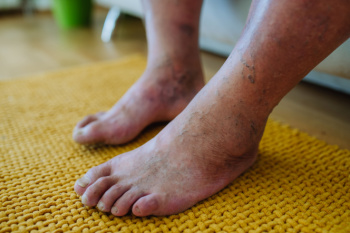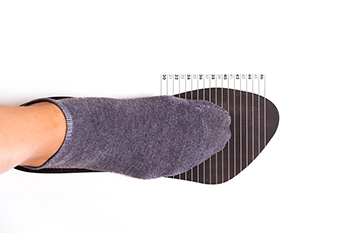Connect With Us
Blog

Preventing foot infections is an essential part of diabetes care. High blood sugar can damage nerves and reduce blood flow, making it harder to feel injuries or for wounds to heal properly. Even small cuts or blisters can become serious if not treated promptly. Daily foot checks are important. Look for redness, swelling, cracks, or signs of infection. Wash feet gently, keep them dry, and moisturize dry skin to prevent cracking. Trim nails carefully and avoid going barefoot, even at home. Wearing well-fitting shoes and using diabetic-friendly socks can help reduce friction and pressure points. Regular visits to a podiatrist can catch problems early and prevent complications. If you have diabetes and notice any changes in the appearance or feel of your feet, or if you have a sore that is not healing, it is suggested that you see a podiatrist for a diagnosis and appropriate treatment.
Diabetic foot care is important in preventing foot ailments such as ulcers. If you are suffering from diabetes or have any other concerns about your feet, contact one of the podiatrists from Ark La Tex Foot & Ankle Specialists. Our doctors can provide the care you need to keep you pain-free and on your feet.
Diabetic Foot Care
Diabetes affects millions of people every year. The condition can damage blood vessels in many parts of the body, especially the feet. Because of this, taking care of your feet is essential if you have diabetes, and having a podiatrist help monitor your foot health is highly recommended.
The Importance of Caring for Your Feet
- Routinely inspect your feet for bruises or sores.
- Wear socks that fit your feet comfortably.
- Wear comfortable shoes that provide adequate support.
Patients with diabetes should have their doctor monitor their blood levels, as blood sugar levels play such a huge role in diabetic care. Monitoring these levels on a regular basis is highly advised.
It is always best to inform your healthcare professional of any concerns you may have regarding your feet, especially for diabetic patients. Early treatment and routine foot examinations are keys to maintaining proper health, especially because severe complications can arise if proper treatment is not applied.
If you have any questions please feel free to contact our offices located in Shreveport and Bossier City, LA . We offer the newest diagnostic and treatment technologies for all your foot and ankle needs.

When adults experience heel pain, a podiatrist begins diagnosis by asking detailed questions about symptoms, daily activities, and any recent injuries. The exact location of the pain, whether under the heel, behind it, or on the sides, can help identify the cause. Common conditions include plantar fasciitis, Achilles tendinopathy, or heel spurs. During a physical exam, the podiatrist checks for tenderness, swelling, range of motion, and how the foot functions during movement. Gait analysis may reveal abnormal foot mechanics. Imaging tests such as X-rays or ultrasound are sometimes used to detect bone spurs, soft tissue damage, or stress fractures. In certain cases, lab tests may be ordered to rule out systemic conditions. Because heel pain can have many causes and may worsen without treatment, it is suggested that you see a podiatrist for an accurate diagnosis and an effective treatment plan.
Many people suffer from bouts of heel pain. For more information, contact one of the podiatrists of Ark La Tex Foot & Ankle Specialists. Our doctors can provide the care you need to keep you pain-free and on your feet.
Causes of Heel Pain
Heel pain is often associated with plantar fasciitis. The plantar fascia is a band of tissues that extends along the bottom of the foot. A rip or tear in this ligament can cause inflammation of the tissue.
Achilles tendonitis is another cause of heel pain. Inflammation of the Achilles tendon will cause pain from fractures and muscle tearing. Lack of flexibility is also another symptom.
Heel spurs are another cause of pain. When the tissues of the plantar fascia undergo a great deal of stress, it can lead to ligament separation from the heel bone, causing heel spurs.
Why Might Heel Pain Occur?
- Wearing ill-fitting shoes
- Wearing non-supportive shoes
- Weight change
- Excessive running
Treatments
Heel pain should be treated as soon as possible for immediate results. Keeping your feet in a stress-free environment will help. If you suffer from Achilles tendonitis or plantar fasciitis, applying ice will reduce the swelling. Stretching before an exercise like running will help the muscles. Using all these tips will help make heel pain a condition of the past.
If you have any questions please contact our offices located in Shreveport and Bossier City, LA . We offer the newest diagnostic and treatment technologies for all your foot and ankle needs.

Wearing the correct shoe size is vital for foot health and overall comfort. Shoes that are too tight or too loose can cause a variety of foot problems. Wearing tight shoes can lead to blisters, calluses, and bunions, while shoes that are too loose can cause instability, leading to sprained ankles or difficulty walking. Inappropriate shoe sizes can also contribute to conditions like hammertoes, corns, or nerve damage. Additionally, wearing ill-fitting shoes can impact posture, leading to back, knee, or hip pain. Children’s feet are especially prone to damage if their shoes do not fit properly as they are still growing. If you have foot pain, possibly from wearing the wrong size shoes, it is suggested that you consult a podiatrist who can treat various foot conditions, and guide you on how to find your right shoe size.
Getting the right shoe size is an important part of proper foot health. Seek the assistance of one of the podiatrists from Ark La Tex Foot & Ankle Specialists. Our doctors will provide the care you need to keep you pain-free and on your feet.
Getting the Right Shoe Size
There are many people who wear shoes that are the incorrect size, negatively affecting their feet and posture. Selecting the right shoes is not a difficult process, so long as you keep several things in mind when it comes to choosing the right pair.
- When visiting the shoe store, use the tools available to measure your foot.
- Be sure there is ‘wiggle room’. There should be about an inch between your toes and the tip of your shoes.
- Do not always assume you are the same size, as manufacturers run differently.
- Purchase shoes later in the day, as your feet swell as the day progresses.
- If a shoe is not comfortable, it is not suitable. Most shoes can’t be ‘broken in’, and comfort should be the ultimate goal when it comes to choosing the right pair of shoes
As our feet hold our body weight and keep us moving, it is important to treat them right. Picking the right pair of shoes can provide your feet comfort and mobility without pain.
If you have any questions, please feel free to contact our offices located in Shreveport and Bossier City, LA . We offer the newest diagnostic and treatment technologies for all your foot care needs.

